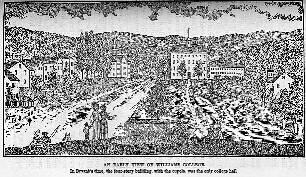William Cullen Bryant
IV. WILLIAM CULLEN BRYANT: 1794-1878.
Birth and Parentage.
William Cullen Bryant, first of our American classic poets, was born November 3, 1794, at Cummington, in the beautiful hill region of western Massachusetts. His father, Peter Bryant, of Puritan descent, was a physician and surgeon -- a country doctor of the old school, skilled by experience, self-forgetful and self-sacrificing. He was a man of literary tastes, and not alone encouraged his son in the development of his talent, but was himself an occasional writer of verse. For several terms he served in the state legislature as representative and as senator. He was reversed for his high ideals, and was widely known as "the good and learned Doctor Bryant." Mrs. Bryant, a descendant of John Alden of the Plymouth Colony, was a woman of great energy and keen moral sense, thoroughly representative of the sturdy New England type. With remarkable persistency, she kept a diary for fifty-three solid years -- in itself a moving testimony to her conscientious, practical character. Each year had its little volume, the paper being sometimes cut and bound by her own hands, and sewed with linen thread of her own spinning. One entry in the diary reads as follows:
"M[onday] 3. Stormy. Wind N.E. Churned -- unwell. Seven at Night a Son Born."
And this brief note records the birth of William Cullen Bryant.
Childhood.
As an infant, the future poet was frail and sickly. Gathering strength as he grew he began early to take unusual delight in the beautiful environment of his country home. Surrounded by rugged hills, the Hoosack range not far distant, amid the narrow winding valleys with their rushing mountain streams, and great tracts of woodland solemn and grand, the boy became a lover of nature. As a child, he prayed that he might be a poet. He was precocious, knew his letters before he was two years old, and was placed in school at four. At nine, he was writing little poems, and paraphrased a part of the book of Job. In these efforts, William Cullen was encouraged and criticised by his father --
"Who taught my youth
The art of verse, and in the bud of life
Offered me to the Muses."1
At thirteen, he composed a satire, The Embargo, which Dr. Bryant thought worthy of publication. This composition, aimed at the President, Thomas Jefferson, after one of the unpopular acts of his administration, appeared in print at Boston in 1808, but was afterward discarded by the poet.
School-days.
The family was now living with Mrs. Bryant's parents on the farm belonging to Ebenezer Snell, a stern,
rigorous Puritan, who nevertheless was not without the grace of humor; and the influence of Grandfather
Snell was strong in the development of the growing boy. The activities of farm life proving too laborious
for William's strength, he welcomed the opportunity to secure a college education. In 1809, he was sent
to the home of an uncle, a clergyman in North Brookfield, to begin the study of Latin. In eight months,
he had mastered the grammar, had read the New Testament, all of Virgil, and the Orations of Cicero.
The next year he attended a school in Plainfield to learn Greek -- to which he gave himself, as he says,
with his whole soul. In September, 1810, Bryant entered Williams College as a sophomore. The experience
of college life was brief, however, for at the end of seven months the student, dissatisfied with the limited
advantages then offered by the institution, withdrew from Williams, expecting to enter Yale College in
the fall. But this anticipation was not realized, as Dr. Bryant found it impossible to furnish the means
necessary to go on, and the period of Bryant's student life -- to his own lasting regret -- was thus abruptly
terminated. 
| Previous chapter | Back | Home | Email this | Search | Discuss | Bookmark | Next chapter/page |
See our FAQ for more details.